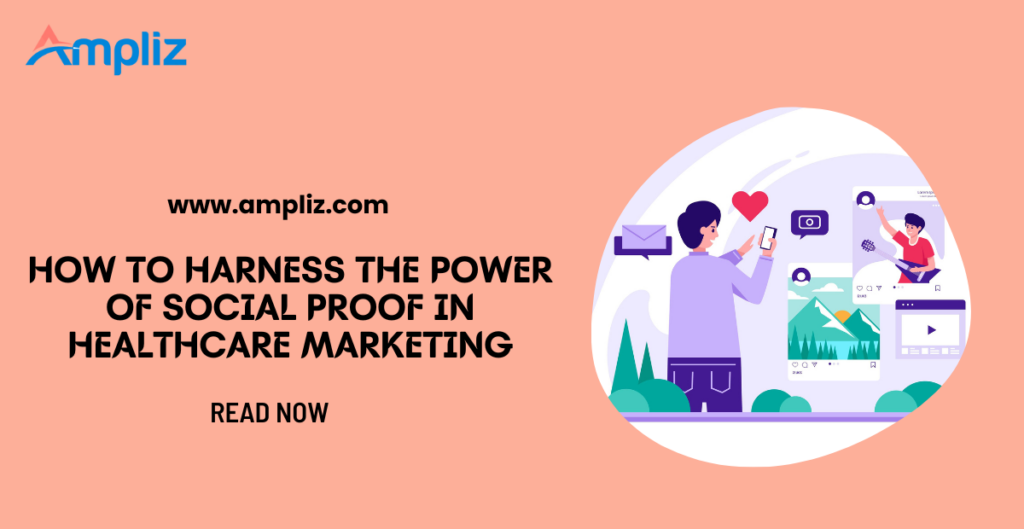If you’re in the healthcare sector, you understand how crucial people’s opinions are for establishing trust and credibility. Nowadays, healthcare professionals are looking for more than mere products and services; they seek assurance, reliability, and proof of outcomes from their vendors.
Social proof in B2B healthcare marketing emerges as a powerful tool to meet these needs. It leverages real-world outcomes, case studies, and testimonials to highlight your healthcare business authenticity and trustworthiness.
In this guide, we’ll explore how social proof can strengthen your connections with healthcare decision-makers and institutions. Plus, we’ll provide six proven strategies to employ social proof effectively in your marketing efforts.
What is social proof?
Social proof is the psychological concept that people are influenced in their decision-making by others. We assume those actions reflect correct behavior and simply follow them. This behavior is known as conformity.
But why does social proof work so well? Basically, it’s deeply rooted in our basic human psychology. We are naturally inclined to follow the crowd, a tendency that becomes even more pronounced in unfamiliar or complex situations.
This is precisely why social proof is leveraged across industries. You’ll see testimonials and accounts of happy customers posted on the websites of different types of businesses. For the best results, they leverage the services of a manufacturing or SaaS SEO agency–depending on the nature of their business–to ensure the visibility of their sites and, therefore, their posted social proof.
Why social proof matters in the healthcare industry?
A vibrant online presence with genuine social proof distinguishes your healthcare solutions from many others out there. With the right type of content, your marketing specialists can ensure audience perception it’s a great company for those seeking compassionate and effective healthcare solutions.
In healthcare, social proof shows how the choices of healthcare organizations are affected by experiences and results achieved by their peers. This makes success stories, case studies, and professional testimonials a powerful tool, helping to guide healthcare decisions and spread trust and positivity in the industry.
That said, social proof significantly impacts customer trust and decision-making in healthcare. When healthcare organizations share positive experiences, others listen and often follow suit. This dynamic shapes how healthcare services, equipment, and technologies are selected. Trust is built when decision-makers see real stories of satisfaction and effectiveness.
Additionally, social proof in healthcare marketing plays a crucial role in building a reputable healthcare brand. Positive accounts and reviews contribute to a stronger, more trustworthy brand image. They tell a story of reliability and quality care that resonates with the decision-makers.
This specialized approach ensures that the digital aspects of your B2B healthcare marketing are as impactful as possible, leveraging technology to enhance the credibility and reach of your offerings.
Overall, when healthcare professionals and organizations see positive feedback and genuine success stories, it elevates their confidence in making procurement decisions. They gain assurance in the experiences of others, which guides them toward making informed choices with a sense of certainty. This shared professional experience, reflected through social proof, reduces their concerns and fosters a collaborative community ethos in the healthcare industry.
How to use social proof in healthcare marketing
Effectively using social proof in marketing can transform how organizations view your healthcare services. Here’s how you can use these valuable experiences and transform them into a key element of your marketing strategy.
1. Display client testimonials on website
Client testimonials are an effective tool for healthcare marketing. They allow potential clients—be it hospitals, clinics, or other healthcare providers–to hear or read about first-hand accounts from others who have experienced your solutions. These can influence someone’s decision, making them feel more connected and confident in choosing your brand.
Showcasing the testimonials on your site sets expectations for new clients and highlights your dedication to satisfaction. Your website, after all, is one of the first places people go to when they’re seeking healthcare solutions. If they see statements from satisfied customers from the get-go, they’ll want to continue exploring what you have to offer.
Keep your content fresh and show ongoing high-quality care by regularly updating your testimonials.
But how should you collect these in the first place? Go directly to your satisfied customers and seek feedback. Just send them an email right after they avail of your services. Before you hit that “send” button, though, make sure to verify email addresses of clients. This helps ensure you send your messages to the right people.
You can ask for different types of testimonials. These include:
- Written testimonials
- Video testimonials
In your message, get their consent again before sharing their stories publicly.
As a final tip, once you have your testimonials for site posting, avoid making too many adjustments or changes to their voice. Instead, keep it as is so the content is authentic and unique to their experience. This helps ensure you respect and celebrate your client’s unique journey, and, therefore, enhance the image of your brand. With that sincerity you allow in testimonials, you can easily build trust in your healthcare solutions.
2. Share UGC on social platforms
User-generated content, or UGC, is content created by people rather than brands. So, technically, the client testimonials we talked about above are also UGC.
You can display your customer testimonials, not just on your website, but also on your social platforms. Encourage professional partners and clients to create other types of UGC for your social media as well. For instance, why not ask them to publish a video of your medical device used in their clinic on LinkedIn. Or ask them to share a picture they took related to your business, tagging your company.
Encouraging your partners to share their experiences is essential for creating a credible and authoritative online presence. Educate them about the good influence their experiences can have on those who are looking for similar solutions.
Instagram, Twitter, and LinkedIn are excellent platforms for sharing these professional insights due to their business-focused audience.
If you’re only starting your social media journey, consider boosting the number of Instagram likes for your initial posts. It’s easy to get free Instagram likes nowadays, for as long as your posted content is high-quality. A high number of Instagram likes acts as a public endorsement, indicating that the community values and trusts the content. As likes accumulate, they serve as a powerful form of social proof, encouraging more users to engage with and follow your account.
Remember to thank clients when they share their experiences on social media. This way, they’ll know you appreciate them. Plus, it can help encourage more people to share their stories too. So when you actively support and share these professional stories, your brand becomes more trusted.
2. Showcase success stories on marketing platforms
Highlighting success stories is essential in healthcare marketing. These stories showcase the benefits that can result from using your products or services. They motivate and inspire other institutions dealing with similar challenges. Success stories validate effectiveness of your offerings and foster a sense of trust and reliability with prospective clients.
Keep the following in mind when crafting realistic and captivating success stories:
- Pay attention to the client’s journey, highlighting the difficulties they encountered and how your solutions helped them overcome these obstacles.
- Provide specific details about the client’s starting situation, the implementation process, and the conclusion to give the narrative more depth and sincerity.
- Use a storytelling technique that engages the audience on an emotional level. Use actual quotes from key stakeholders or project leads to provide a more compelling personal touch to the story.
- Make sure the narratives are simple to understand and free of technical jargon that may put off or confuse those not specialized in your field.
Post these success stories on your website and social media channels. Leverage email marketing as well.
With this approach, you can create inspiring success stories and influence decisions. Success stories encourage your audience to start their healthcare journey as they highlight your solution’s real-world effectiveness. They turn into powerful social proof, boosting your solutions’ impact and reliability which invites others to engage with your company.
3. Leverage online reviews the right way
Online reviews are critical in healthcare decision-making. Prospective clients turn to these reviews to judge the quality and reliability of medical professionals. Positive reviews can significantly boost your reputation and attract more business. On the other hand, negative feedback can deter people. In fact, 87% of consumers wouldn’t consider a business if it had less than 3 stars out of 5.
To handle customer reviews effectively, you need to take an active role. This means maintaining a close eye on social media and review sites so you can respond.
Reply to all feedback, whether positive or negative rather, than only focusing on earning positive ratings. Over 90% of people trust a brand less if it deletes negative comments instead of responding to them. Responding to negative feedback promptly and professionally shows that you value your clients’ satisfaction and are willing to make improvements. This can transform potentially negative feedback into a chance to showcase your dedication to quality and service excellence.
Educate your staff on the value of customer satisfaction and the influence of internet reviews. This tactic can help to create a culture where providing superior products and services is the primary goal. Showcasing helpful ratings in advertisements and on your business’s website can help build your business’s credibility and position it as the top option for healthcare organizations seeking reliable partners.
5. Encourage word-of-mouth marketing
In the B2B healthcare sector, word-of-mouth marketing remains an extremely effective method for building relationships and expanding your client base. The endorsements and recommendations among healthcare professionals and organizations carry immense weight, influencing decisions in a way that traditional advertising often cannot match.
To create a word-of-mouth friendly environment, focus on consistently delivering exceptional quality and service. Products and solutions that genuinely meet and exceed expectations naturally encourage clients to share their positive experiences within their professional circles. This means they can mention your brand at conferences and during industry networking events they attend.
Engage actively with your clients to understand their needs and the challenges they face. Aligning your solutions with client needs will satisfy them and make them more likely to recommend your services to others in the industry.
Showing off the quality of what you offer and keeping good relationships with your clients helps build your brand’s name. It quickly builds trust and gathers a group of trusted people who back up your healthcare solutions. In effect, this network of satisfied clients acts as social proof, showcasing your business as trustworthy and reliable.
6. Highlight awards and certifications
Highlighting awards and certifications significantly enhances social proof and establishes trust within the healthcare sector. Your awards reflect your commitment to your expertise and industry standards, and dedication to excellence. Putting them just on the wall is a waste!
Place them on your website, in your emails, and on social media platforms. This can boost your organization’s reputation and visibility. Sharing these achievements online helps reach more potential clients and shows that you are a leading provider equipped with top-tier expertise.
Additionally, you can incorporate these types of recognition into various forms of marketing material on:
- Brochures
- Email signatures
- Business cards
Showcasing awards and certifications strategically can solidify your reputation in the B2B healthcare industry. This approach also helps build stronger, more trusting relationships with both current and future clients.
In closing
The use of social proof in healthcare marketing can help you build a more engaged client base and establish a stronger, more reliable presence in the healthcare sector. Do it right and you’ll see increased client satisfaction, improved outcomes from your products or services, and an all-around stronger business.
Now you’re equipped with essential strategies. Use customer testimonials and share real-world success stories to connect and inspire. Boost your credibility through online reviews and user-generated content (UGC) to showcase the effectiveness and reliability of your offerings.
Additionally, encourage professional referrals to encourage word-of-mouth recommendations, and proudly display any awards and certificates. Each of these steps can hugely increase your trust and credibility within the B2B healthcare market.
So, go ahead and embrace social proof as a key part of your marketing strategy. You’ll reap excellent benefits.



